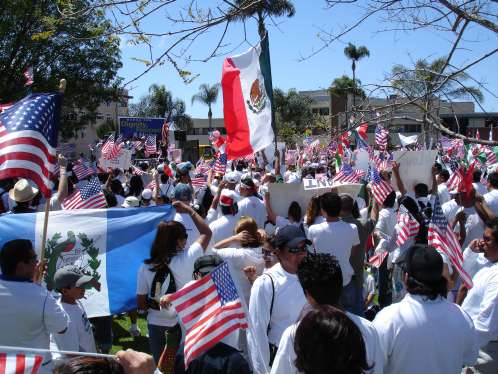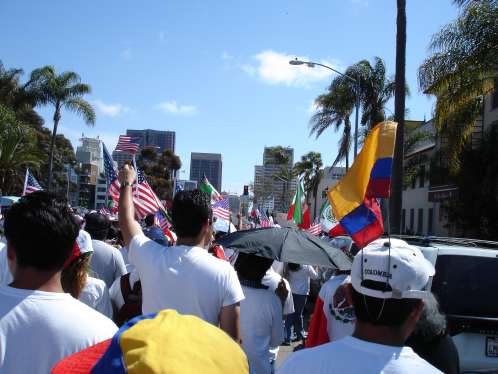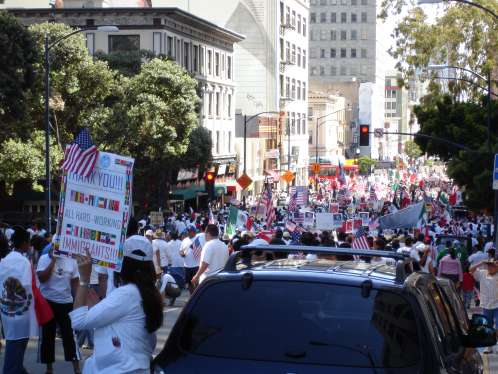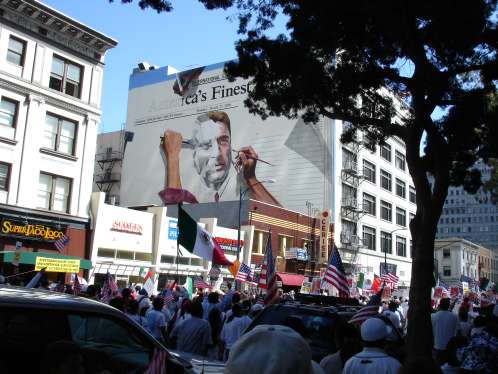
|

|

|

|

|

|
Sunday, April 9, 2006

Today, hundreds of thousands throughout Aztlán and the United $tates rallied, marched and demonstrated for migrant rights. More events are scheduled for tomorrow throughout the country. In San Diego, tens of thousands of people rallied and marched in downtown. This writer attended part of a rally at San Diego City College and then the event in Balboa Park that was more publicized.
As predicted in a previous article ("Hundreds march in San Diego for migrant rights"), the mainstream media tried to turn the flag thing into a divisive issue for migrant-rights demonstrators and a means to discredit them. There were so many Amerikan flags at the Balboa Park rally that it almost looked like a Fourth of July event. Still, this was not enough for the San Diego Union-Tribune, which suggested that people reluctantly waved Amerikan flags only because they knew people who could be deported. Patriotism in the United $tates typically means support for reactionary movements and repression. It is not surprising that not all of the Amerikan flag-waving at recent migrant rights demonstrations and events represents die-hard Amerikkkan patriotism. Still, the Union-Tribune article is reactionary and clearly intended to discredit the demonstrators. A local English-language TV news station, KUSI, played a video clip of a police officer praising the marchers for carrying Amerikan flags.
This writer was not able to observe all the rallies and marches scheduled for the same day in San Diego -- the amount of activity in response to the anti-migrant movement and Congressional debate (the Senate is now in a two-week recess) has grown rapidly -- but one rally at San Diego City College that began in the morning, which on the surface appeared to be more political, actually wasn't more politically advanced than the rally in Balboa Park. In fact, it had a reactionary overtone at one point despite the ostensibly pro-amnesty theme. A certain organization calling itself "socialist," but agitating for the demands of white workers, tabled at the event and later took a huge sectarian banner to the march. One speaker outside the college said that "African Americans" should support legalization of undocumented migrants, but the only reason she gave was that undocumented migration was supposedly hurting Black people's wages, that undocumented migration itself was a problem. But it is Euro-Amerikan imperialism, not migration or even undocumented migration itself, that is the cause of the Black nation's lack of economic self-determination. The Black nation must have self-determination. Liberation from imperialism requires unity with the world proletariat and relentless opposition to white nationalism and the Euro-Amerikan labor aristocracy.
The same speaker at College Park claimed without evidence that undocumented migration resulted in losses in real income for the majority of people in the United $tates. The speaker also claimed that the majority of the poor people in the United $tates were white. She said that amnesty would improve the economic conditions of the majority of white people. The whole speech illustrated the problems with talking about economic inequality without addressing international differences and national oppression, and the problems with talking about amnesty addressing imperialist privilege and repression. Fascist repression of migrant proletarians must be opposed regardless of whether it increases or decreases the incomes of U.$. workers. What some pseudo-socialists claim is working-class unity and solidarity is actually a form of white nationalism.
Although there was some emphasis on voting and ensuring the passage of "comprehensive" immigration reform legislation that is still repressive and restrictive, many of the messages at the rally in Balboa Park were progressive, focusing on civil and humyn rights. Calls for open borders or no borders were mostly confined to signs, but one chant at the rally was "Raza sí, migra no."
At the rally in Balboa Park, supporters of a group that unites with white nationalists against Bu$h were present. They called for a unity of U.$. people against Bu$h, rather than unity of oppressed-nation peoples against Euro-Amerika. At the same rally were people telling ralliers to vote Demokrat. One march sign affiliating itself with a local SEIU union read: "Today we march. Tomorrow we vote."
Flags at the rally and march represented different ethnicities and nationalities. The day before, this writer heard a guest on a Spanish-language radio program advising people to bring Amerikan flags. His justification was that more people could unite behind the Amerikan flag than any other flag. Even carrying both the Mexican flag and the Amerikan flag, to symbolize peace or "Mexican-American" identity, was discouraged.
Migrants who come to the United $tates continue to be surprised how the yanquis have appropriated the word "America" for reactionary political purposes. Many try to reclaim the word; some wave the Amerikan flag in a subtly ironic way. However, pandering to the mainstream media is a failed strategy. What flag to hold should not be a divisive issue for broad-based demonstrations against the anti-migrant movement. Although some organizers named the march "Immigrants are America," the demonstration today for the most part wasn't specifically a drive for migrants to become naturalized as U.$. citizens. Nor was it a demonstration against U.$. imperialism as a whole.
It is not people bringing Mexican flags to demonstrations who are divisive. The anti-migrant movement and opposition to it already manifests itself as a conflict between Third World peoples and the Euro-Amerikan nation. The anti-migrant movement openly states that Third World people are a threat. Third World flags play a progressive role in this struggle. Telling people not to bring them is divisive. Making agreement on the flag issue a condition of cooperation is divisive at this point in time, too.
There can be no compromising with white nationalism, ideologically or in terms of agitation and slogans. The failure of any significant segment of the Euro-Amerikan population to join even the anti-HR 4437 protests is one proof of this -- but an anti-Amerikan movement, necessary to oppose fascism more effectively, can be built through unity and struggle with oppressed people participating in the existing migrant rights demonstrations. Some tactical cooperation with capitalists who oppose further immigration restrictions, and unpopular deaths from repressive policies like Operation Gatekeeper, is possible.
Concerns about bad publicity, resulting from the visibility of Mexican flags, are exaggerated. The media always finds ways to discredit protesters and demonstrators. A man who appeared to be the white supremacist Bryan Barton was in downtown trying to provoke marchers by yelling over a bullhorn. As usual, Barton was trying to pull a publicity stunt. TV station KUSI suggested that marchers posed a physical danger to Barton. Barton is a known instigator. The labor aristocracy could have easily sent someone else in his place.
Few other Euro-Amerikans attended the march, which went from Balboa Park, through downtown, to the San Diego City and County Administration Building near the waterfront. Most were supportive. However, reportedly, there was a group of Minuteman vigilantes or their supporters protesting in downtown. This may have been the only organized group of ordinary Euro-Amerikans. In spite of some groups' empty rhetoric about white workers having common interests with oppressed-nation workers, there was no white working class expressing internationalist solidarity with migrant proletarians.
Representatives of the labor aristocracy showed up to call for a path to citizenship and oppose temporary-worker programs, but used white-worker interests as the basis of their reasoning. As MIM and one honest observer writing for the Los Angeles Indymedia newswire have pointed out, white labor itself has been virtually absent at the recent migrant rights demonstrations. The representatives of Euro-Amerikan labor just show up to try to turn the migrant rights demonstrations into anti-guest-worker demonstrations.
The fact that an amnesty-themed rally in San Diego today took on a reactionary character is disturbing, but not surprising. Amnesty, without a temporary-worker program and more border repression, isn't really on the table in the so-called immigration reform debate. The labor-aristocracy movement that has congealed based solely on opposition to guest-worker programs, without any critique of imperialism, isn't going to disrupt the anti-migrant movement. On the one hand, there are those who call for amnesty but support closed borders and repression using military troops; on the other, there are forces even more backward who go so far as to call guest-worker proposals "shamnesty." New Mexico Governor Bill Richardson, half-way critic of HR 4437, illustrates the pitfalls of calling for legalization without opposing border oppression.
Today's march in San Diego was the largest ever in the history of the city, even by mainstream media accounts. Other recent migrant rights demonstrations have set records in other cities, including Chicano, Denver, Los Angeles, and Phoenix. Some say that this is a new civil rights movement, for the civil rights of immigrants. It would be more accurate to say that this is a migrant workers' rights movement. Organizers and demonstrators often use the word "immigrant" in describing their intentions and whom they support, but opposition to temporary-worker programs has not been the main theme of migrant rights demonstrations. Some reject the "immigrant" label entirely, saying that migrants are in their own land. The migrant rights demonstrations are largely in response to the anti-migrant movement and attacks on migrant proletarians, rather than driven by a desire for an increased level of imperialist-country citizenship with the same rights as first-class citizens. Imperialist-lackey and opportunist elements dispersed Amerikan flags to ralliers and marchers, but the highly visible Amerikan flags did not completely obscure the fact that the march was an act of oppressed nations.
One reason why people are not as quick to call this a workers' rights movement is that they would have to explain the lack of participation by Euro-Amerikan workers, obvious to many. They would also need to explain the difference between the migrant rights demonstrations and the Euro-Amerikan-dominated antiwar movement that manages to smuggle in white-worker demands between antiwar chants, alienating oppressed nationalities.
Organized Euro-Amerikan workers simply have not shown up in significant numbers, even to make a show of solidarity with oppressed-nation workers in their unions. They don't even show up to oppose guest-worker programs. And significantly, slogans opposing the repression of migrant workers are more common than slogans pandering to Euro-Amerikan economic-nationalist interests in migrants continuing to work in the United $tates. This is a movement of the oppressed, not a movement of the whole U.$. working class. (White liberals making up excuses for not coming complain that rally leaders don't speak English as frequently as Spanish. Most white liberals, all talk, no action, just aren't motivated enough for Euro-Amerikans to have a larger leadership role in the resistance to the anti-migrant movement.) The scattered Euro-Amerikans who do show up do include some middle-class people who feel they benefit from migrant workers' labor. Others want open borders or a world without borders, welcome migrants for religious reasons -- sentiments that progressives can unite with on a humyn-rights level -- or support gay immigration equality.
Several people marched for gay immigration equality today. One sign called for immigration equality and had a rainbow gay pride symbol. Someone else held up the blue and yellow equal sign known as a symbol of gay and transgender humyn rights. People identifying themselves as Chicana lesbians have been at previous marches. MIM has struggled to get people to see the connection between migrant rights and gay rights, and gay marriage equality and anti-gay discrimination in immigration policy as oppressed-nation issues. Of course, many oppressed-nation gay people marched today without identifying themselves as such, but some openly associated themselves with the struggle for gay immigration equality. The recent migrant rights demonstrations have given gay immigration equality advocates a great opportunity to express themselves in a public arena. Many Euro-Amerikans, regardless of sexual orientation, do not oppose the anti-migrant movement, but conflicts within the Euro-Amerikan nation over things such as gay immigration equality still play a progressive role.



Notes:
1. "Thousands march downtown for immigration rights," SignOnSanDiego.com , 9 April 2006, 0;http://www.signonsandiego.com/news/metro/20060409-1531-bn09bigmarch.html>.
2. Elliot Spagat / Associated Press, "Nearly 50,000 march in San Diego for immigrant rights," MercuryNews.com , 9 April 2006, /mercurynews/news/local/states/california/northern_california/14304228.htm>.
Saturday, April 8, 2006